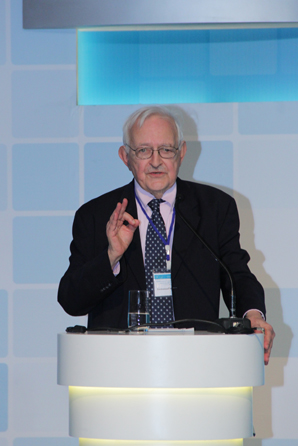Immanuel Wallerstein, one of the main founders and most prominent proponents of the World Systems Theory, a system for the understanding of international relations based on power relations between states in the modern world, presented a Distinguished Lecture as part of the Third Annual Conference of Arab Research Centers. A yearly meeting which is given over to a new topic each year, the 2014 Conference was dedicated to studying the Gulf Cooperation Council and comes at a critical juncture for a coalition born to counter growing Iranian over-reach in the 1980s.
 |
| Immanuel Wallerstein |
Wallerstein’s lecture, delivered as the final event on the second day of the conference, was delivered to a packed lecture hall. Addressing the audience and its concerns, Wallerstein explained that “US policy is difficult to predict” and that, he said, was worrying to the members of the audience. Later in his remarks, Wallerstein made clear that the unpredictability of future American actions was particularly difficult for states that had been key US allies in the region: Israel and Saudi Arabia. This new paralysis on the part of the United States, did give these countries freedom to act with greater independence.
Wallerstein’s historical approach to the subject of his talk, titled “The Decline of US Power and its Consequences for Geopolitics in the Gulf”, allowed him to illustrate more clearly his understanding of hegemonic power. Contrary to widely held notions, Wallerstein asserted that, at least from the years 1945 to 1970, the United States was a pure world hegemon, unchallenged in its authority by the Soviet Union. During that period of time, the status quo between American and Soviet empires remained unchanged as it had stood at the close of the Second World War. Wallerstein also went on to propose a stricter definition of hegemonic power than the one that has currency at present: a hegemonic power, he said, is one that “achieves 95% of its goals, 95% of the time”. Counter intuitively, Wallerstein cited the case of the Cuban Revolution, often seen as a loss for the United States, as an exception of the hegemonic powerof the Soviet Union: Castro and his allies, explained Wallerstein, had removed the leadership of what had been a pro-Moscow Communist Party and compelled the Soviets to support them in their takeover of the Caribbean nation. It was another act of defiance against the Soviets that would ultimately lead to the crumbling of the US edifice.
The 1968 Battle of Saigon—which the Viet Cong undertook against Soviet advice—would also become an early affront to US hegemony. The symptoms of defeat, including the economic measures in the Nixon Shock of 1971, would ultimately create the Vietnam Syndrome: the reluctance amongst the US public to become engaged in foreign military campaigns, which survives to this day. This public sentiment amongst American citizens has very real results for the Gulf: as countries within the American defense sphere look to Washington for leadership and protection, the American body politic is unable to persuade its public to become more proactively involved in the Middle East. This was, suggested Wallerstein, a common feature of empire: the US public enjoyed the fruits of being a world hegemonic power, but did not want to pay the price. When asked how this would ultimately be reflected in the GCC states, Wallerstein was quick and to the point: “I don’t know”.